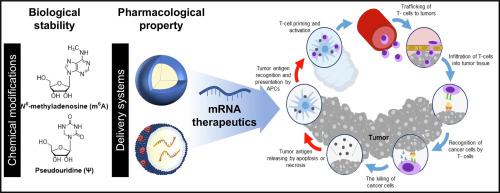Advanced Drug Delivery Reviews ( IF 15.2 ) Pub Date : 2023-06-25 , DOI: 10.1016/j.addr.2023.114973 Geonhee Han , Dahye Noh , Hokyung Lee , Sangmin Lee , Sehoon Kim , Hong Yeol Yoon , Soo Hyeon Lee

|
RNA vaccines have demonstrated their ability to solve the issues posed by the COVID-19 pandemic. This success has led to the renaissance of research into mRNA and their nanoformulations as potential therapeutic modalities for various diseases. The potential of mRNA as a template for synthesizing proteins and protein fragments for cancer immunotherapy is now being explored. Despite the promise, the use of mRNA in cancer immunotherapy is limited by challenges, such as low stability against extracellular RNases, poor delivery efficiency to the target organs and cells, short circulatory half-life, variable expression levels and duration. This review highlights recent advances in chemical modification and advanced delivery systems that are helping to address these challenges and unlock the biological and pharmacological potential of mRNA therapeutics in cancer immunotherapy. The review concludes by discussing future perspectives for mRNA-based cancer immunotherapy, which holds great promise as a next-generation therapeutic modality.
中文翻译:

癌症免疫疗法 mRNA 疗法的进展:从修饰到递送
RNA 疫苗已证明其能够解决 COVID-19 大流行带来的问题。这一成功导致了 mRNA 及其纳米制剂作为各种疾病潜在治疗方式的研究复兴。目前正在探索 mRNA 作为合成蛋白质和蛋白质片段用于癌症免疫治疗的模板的潜力。尽管前景广阔,但 mRNA 在癌症免疫治疗中的使用仍受到挑战的限制,例如针对细胞外 RNase 的稳定性低、向靶器官和细胞的递送效率差、循环半衰期短、表达水平和持续时间可变。本综述重点介绍了化学修饰和先进递送系统的最新进展,这些进展有助于应对这些挑战并释放 mRNA 疗法在癌症免疫治疗中的生物学和药理学潜力。该综述最后讨论了基于 mRNA 的癌症免疫疗法的未来前景,该疗法作为下一代治疗方式具有广阔的前景。




















































 京公网安备 11010802027423号
京公网安备 11010802027423号